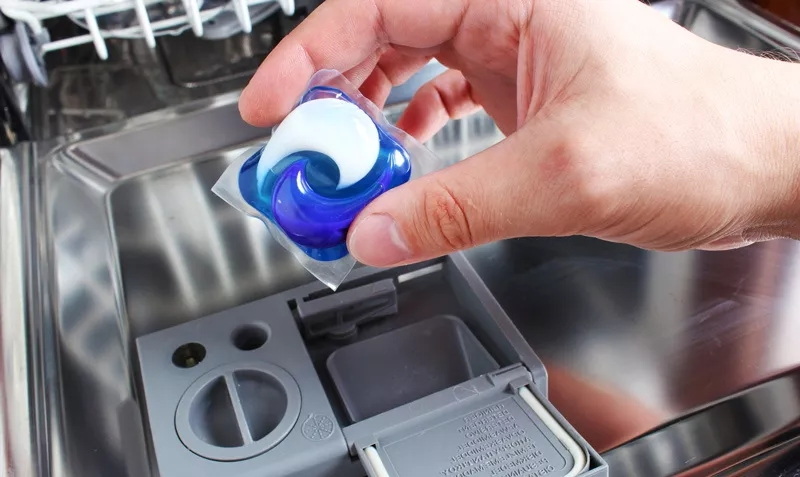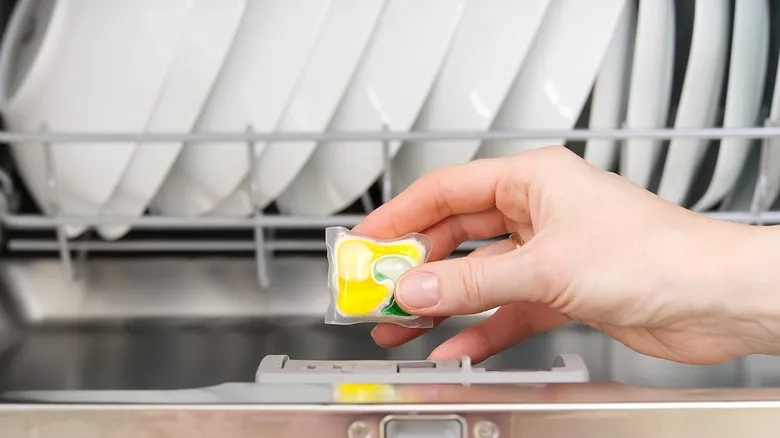Dongguan UFine Daily Chemical Co.,Ltd.
- All
- Product Name
- Product Keyword
- Product Model
- Product Summary
- Product Description
- Multi Field Search
Views: 222 Author: Tomorrow Publish Time: 10-17-2025 Origin: Site











Content Menu
● Understanding Dishwasher Pods and Their Function
● Immediate Solutions If You Run Out of Dishwasher Pods
>> Use Liquid Dish Soap Sparingly
>> Baking Soda as a Mild Cleaner
>> White Vinegar for Rinse Aid Effect
● Homemade Dishwasher Detergent Alternatives
● Best Practices to Optimize Dishwasher Cleaning Without Pods
>> Regular Dishwasher Maintenance
● What Not To Do Without Dishwasher Pods
>> Avoid Using Too Much Regular Dish Soap
>> Don't Skip Pre-Rinsing Dirty Dishes
>> Avoid Abrasive Scrubbing Inside Dishwasher
● When to Replace Running Out of Pods with Manual Dishwashing
● Additional Tips for Extending Dishwasher Performance Without Pods
● FAQ
>> 1. Can I use liquid dish soap instead of dishwasher pods?
>> 2. What homemade dishwasher detergent works best?
>> 3. How often should I run a vinegar cycle in my dishwasher?
>> 4. Is pre-rinsing dishes necessary?
>> 5. Can I use baking soda alone to wash dishes?
Running out of dishwasher pods can happen unexpectedly, especially when you're busy or forget to restock. However, not having dishwasher detergent on hand doesn't mean you have to put off cleaning your dishes or wash them manually every time. There are several practical alternatives and tips to keep your dishwasher running smoothly even if you run out of pods. This article will guide you through various solutions, homemade substitutes, and best practices for dishwasher use without pods.

Dishwasher pods are pre-measured detergent packets designed to clean dishes efficiently in a dishwasher. They contain a mix of surfactants, enzymes, and other cleaning agents that break down food residue, grease, and stains. The pods dissolve quickly during the wash cycle to release cleaning agents at the right time.
When you run out of dishwasher pods, it's important to consider alternatives that will not damage your machine or leave residues on your dishes. Some dishwasher detergents can harm your dishwasher's mechanics or dishwasher-safe dishes if not properly used.
Liquid dish soap intended for handwashing dishes can be used in a pinch but with extreme caution. Only a very small amount is needed to avoid excess suds, which can overflow from your dishwasher causing a mess and possibly damaging your unit. To do this, put just a few drops in the detergent compartment and run a quick wash cycle on the lowest setting to minimize sudsing.
Baking soda is a mild abrasive and deodorizer. Sprinkle a tablespoon or two in the bottom of your dishwasher and run a regular cycle. While it won't replace the strong cleaning power of pods, it helps remove odors and light stains. Additionally, baking soda is non-toxic and safe for materials inside your dishwasher.
White vinegar works as a natural rinse aid. Adding a cup of white vinegar to the bottom of your dishwasher before starting a rinse cycle helps dissolve leftover detergent and mineral deposits, giving your dishes a cleaner finish. For best results, pour the vinegar into a dishwasher-safe cup and place it upright on the top rack.
Lemon juice adds acidity that can help break down grease. You can pour a few tablespoons of lemon juice in the detergent dispenser to enhance cleaning without pods. The natural citric acid also helps tackle odors and leave a refreshing scent.
If you frequently run out of pods, making your own dishwasher detergent could be useful. Here are a few DIY recipes:
- Baking Soda + Washing Soda + Citric Acid Mix
Mix 1 cup washing soda, 1 cup baking soda, and 1/4 cup citric acid. Store in an airtight container and use about 1 tablespoon per cycle. Washing soda is stronger than baking soda and helps with grease and stain removal, while citric acid enhances cleaning power and combats hard water buildup.
- Borax + Baking Soda Mix
Combine 1 cup borax and 1 cup baking soda. Use 1-2 tablespoons per wash cycle. Borax acts as a disinfectant and helps lift tough stains.
- Vinegar and Baking Soda Combination
Place 1 tablespoon baking soda on the bottom and add 1 cup white vinegar in the rinse cycle. This combination reacts to create a natural cleaning foam that removes residues and odors.
Make sure to keep these mixtures dry and fresh for best results. Homemade mixes are economical and typically free from harsh chemicals found in some commercial pods.

Remove large food debris or rinse dishes before loading. This is important because when using weaker or homemade detergents, leftover food is less likely to break down during the wash cycle. Pre-rinsing prevents re-deposit of grime and helps achieve cleaner results.
Proper dishwasher loading enhances water and detergent circulation. Avoid overcrowding, ensure no dishes block spray arms, and angle plates or pans downward. Proper arrangement allows cleaning solutions, whether pods or alternatives, to reach all surfaces.
Running the dishwasher on a hotter cycle improves cleaning efficiency. Hot water melts grease and activates enzymes better in detergents. If your dishwasher has an “extra heat” or “heavy” setting, choosing these can compensate for less potent cleaning agents.
Running an empty cycle with white vinegar or a commercial dishwasher cleaner once a month prevents build-up of grease, limescale, and detergent residue. This keeps your machine functioning optimally and prevents odors.
Regular hand dish soap is formulated to create lots of suds, which can overflow during a dishwasher cycle leading to leaks or damage. It's best to avoid using it except in very minimal amounts and only as a last resort.
Without enzymes and powerful surfactants typical in pods, heavy food stains or proteins like egg or cheese may not wash off completely. Pre-rinsing dishes improves cleaning and prevents buildup.
Do not scrub the interior of your dishwasher aggressively or use abrasive materials, as this can damage the racks, heating element, or spray arms. Use mild cloths and gentle methods for cleaning the machine's interior.
If alternatives aren't available or heavily soiled dishes won't come clean with substitute methods, handwashing is the best option until you restock dishwasher pods. Use hot water, detergent specifically meant for handwashing, and scrub thoroughly to maintain hygiene and cleanliness.
Additionally, consider washing pots, pans, and large cooking utensils by hand, as these usually require tougher cleaning than dishwasher alternatives can provide.
- Use a rinse aid substitute: White vinegar can also help prevent spots and film on glasses and dishes common when detergent is insufficient.
- Run shorter cycles: For lightly soiled dishes, shorter wash cycles may prevent residuals from settling on plates.
- Clean filters regularly: Keep the dishwasher's food trap and filters clear to maintain water flow and avoid unpleasant odors or clogs.
- Use warm water heater setting: Ensuring your hot water heater is set appropriately (around 120°F/49°C) helps improve dishwasher performance overall.
Running out of dishwasher pods doesn't have to disrupt your dish-cleaning routine. You can use household items like baking soda, vinegar, lemon juice, or homemade detergent mixes to maintain clean dishes. Ensuring your dishwasher is properly loaded, pre-rinsing dishes, and using the hot water cycle will enhance cleaning performance without pods. Avoid using excessive hand soap that creates suds, and maintain your dishwasher regularly for best results. When in doubt, revert to handwashing to ensure hygienic dish cleaning while you restock your supply.

You can, but only use a tiny amount and avoid regular dish soap to prevent excessive suds in your dishwasher.
A mix of baking soda, washing soda, and citric acid is effective and commonly used as a homemade alternative.
Running a vinegar rinse once a month helps remove buildup and keeps the dishwasher clean and odor-free.
Yes, especially without pods, pre-rinsing helps prevent residue and food particles from sticking to dishes.
Baking soda alone helps with odors and mild cleaning but doesn't replace the cleaning power of dishwasher pods entirely.